Solar E-Bike Market Insights, 2040
The global solar e-bike market set to reach at USD 1.66 billion in 2030, and is projected to reach USD 6.01 billion by 2040, registering a CAGR of 13.7% from 2030 to 2040.
The solar e-bike is a vehicle that uses solar power as its primary energy resource. These bikes primarily use solar technology such as solar panels, battery packs, and nano solar technology (solar cells) to keep the motor running. These cells convert sunlight to energy needed to power up the battery of the vehicle. The powering up happens when photons hit the photovoltaic cells and excite the electrons to allow them to flow through and produce an electric current. Moreover, these bikes include sensors & electric displays that provide additional assistance to the rider required for a smooth ride. This helps in helping the pedal-power of the rider. Use and availability of solar e-bikes are gaining a lot of momentum globally, owing to quickly rechargeable batteries, lightweight motors, and technological advancement of bike components. For instance, Ele launched a solar e-bike with solar panels on its wheels that rotate 30 degrees on both sides, to face the sun. This is to absorb as much sun-power as it can. This hybrid bike can be charged through electricity and the sun.
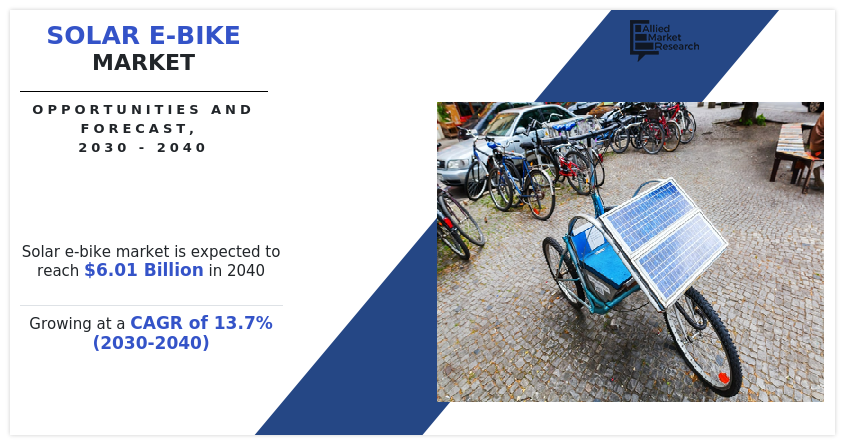
Solar e-bikes are a flexible, versatile, eco-friendly, and trendy mode of transport. Consumers look up to them as an ideal substitute for traditional scooters, smart cars, and public transportation. These bikes help to tackle traffic congestion, owing to the compact size, attain higher speeds with lesser effort, and gain from the advantages of health benefits achieved with peddling specifically (in case of bicycles). Apart from this, the adoption of solar e-bike applications in several sectors such as logistics and e-bike rental services, is expected to drive the solar e-bike market during the forecast period.
Factors such as positive government regulations and policies to encourage the use of solar e-bikes, increase in fuel costs, and rise in interest in cycling as a fitness & recreational activity is expected to drive the solar e-bike market growth. However, high purchase & and maintenance cost of solar e-bikes and low operating efficiency of solar e-bikes as compared to traditional bikes are some of the factors that hinders the market growth. Furthermore, technology advancement in solar e-bikes and improvement in the bicycle infrastructure are expected to offer lucrative opportunities for market growth.
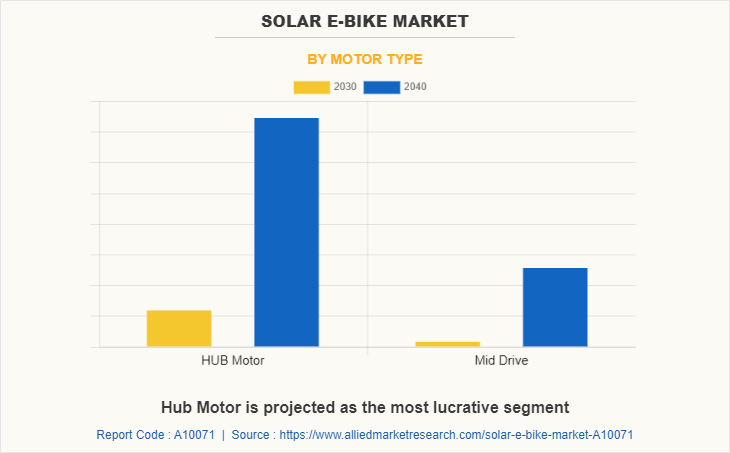
The solar e-bike market is segmented into motor type, battery type, application, consumer segment, power output and region. By motor type, it is fragmented into a hub motor and a mid-drive. Based on battery type, it is classified into lead-acid, lithium-ion (Li-ion), and others. By application, the market is divided into sports, fitness, and daily commute. By consumer segment, the solar e-bike industry is categorized into urban and rural. By power output, it is fragmented into 250W & less than 250W and above 250W. By region, it is analyzed across North America, Europe, Asia-Pacific, and LAMEA.
Accell Group, CSE EV Group Co., Ltd., Derby Cycle, Fuji-Ta Bicycle Co., Lt., Giant Group, Merida Bikes, Royal Gazelle, Trek Bicycle Corporation, Yadea Technology Group Co, Ltd., Yamaha Motor Corporation, Kona Bikes, The Sun Trip, Vintage Electric Bikes, Charge And Bottecchia Cicli S.r.l are some of the leading key players operating in the solar e-bike market.
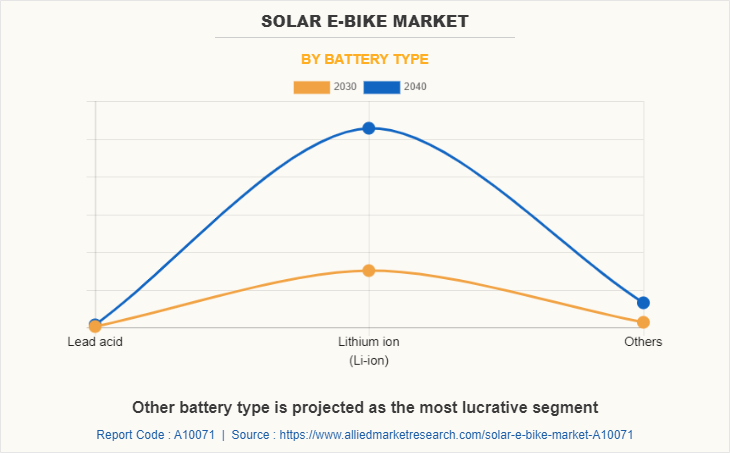
Positive government regulations and policies to encourage the use of solar e-bikes
Governments of various countries are taking initiatives to reduce the carbon footprints by encouraging the use of small electric vehicles such as solar e-bikes, fuel cell bikes, and e-scooters, owing to increase in awareness toward the hazardous effects of using vehicles running on fossil fuels. Moreover, governments are constructing bicycle-friendly streets, which are encouraging individuals to opt for solar e-bikes as a key mode of commute.
Furthermore, to encourage the use of these bikes, governments around the world are supporting for the purchase of solar e-bikes, in terms of tax credits and incentives. For instance, in June 2019, the Indian Government announced a plan to lower the goods & service tax (GST) on e-vehicles including solar e-bikes from 12% to 5% for faster adoption of electric/solar vehicles. Also, several countries are implementing plans to ban petrol and diesel vehicles including bikes in the 2030-2040 timeframe, to reduce emissions, thereby encourage the sales of solar electric bike market. Hence, the positive government regulations and policies to ban or reduce the sale of vehicles running on internal combustion engines (ICEs) is expected to aid the solar e-bike market growth in the forecast period.
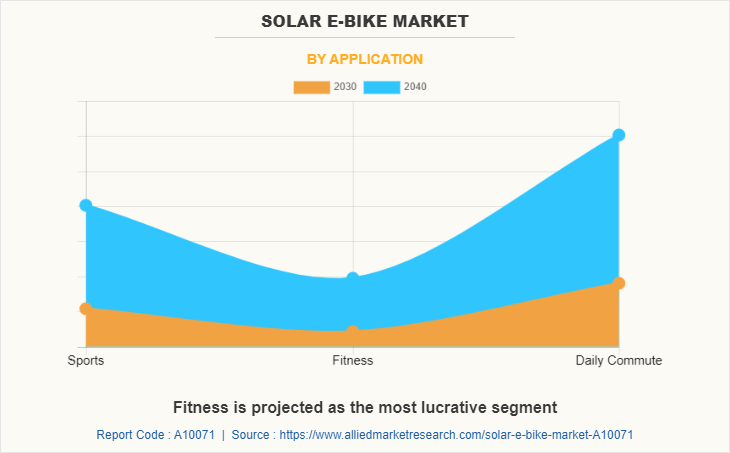
Increase in fuel costs
Increase in fuel prices is the result of surge in crude oil costs, which are majorly controlled by the Organization of the Petroleum Exporting (OPEC) countries. Thus, increase in fuel costs over the past decade has led to rise in adoption of solar e-bikes as a mode of daily commute.
Moreover, prices are expected to increase with limited sources of crude oil in the future. Although, the solar e-bike components such as photovoltaic cells & batteries costs compared to gasoline prices, have been low in many countries such as China, Germany, and Denmark, which is further fueling the demand for solar e-bikes in such countries. Furthermore, solar e-bikes equipped with electric motors help in maintaining higher speed more effectively as well as make the ride more comfortable on rough roads. Therefore, increase in fuel cost is expected to fuel the consumer inclination toward solar e-bikes, thereby boosting the growth of the solar e-bike market.
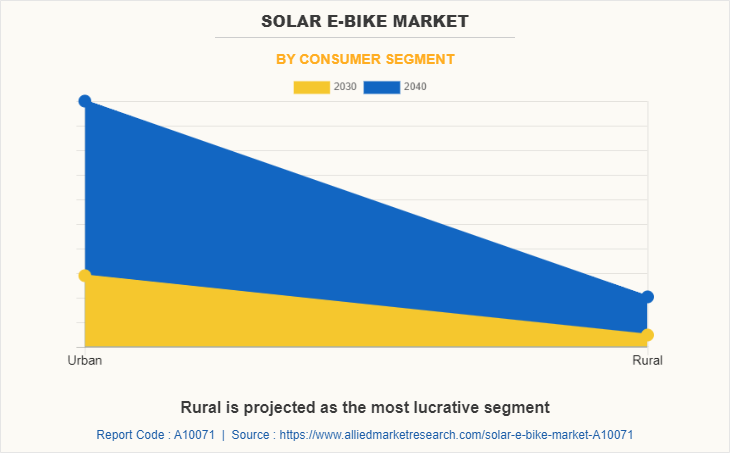
High purchase and maintenance cost of solar e-bikes
High cost of solar e-bike is a major factor that restrains the growth of the solar e-bikes market. The cost of the battery and technology makes solar e-bikes costlier as compared to traditional bikes or conventional scooters. Hence, consumers find conventional bikes superior in performance with same or less price. Moreover, the use of solar panels used in the bikes incurs the maximum cost, thereby restraining the growth of the market.
Furthermore, charging and maintenance of the battery is one of the major concerns for the adoption of solar e-bikes. High battery pack replacement cost, owing to the short life of the batteries and high electric component maintenance cost increases the overall maintenance cost of these bikes. Hence, upsurge in the adoption of solar e-bikes in other than developed countries such as China and the U.S., are limited by high costs. Therefore, high maintenance as well as the purchase cost is a major factor that restrains the growth of the solar e-bike industry.
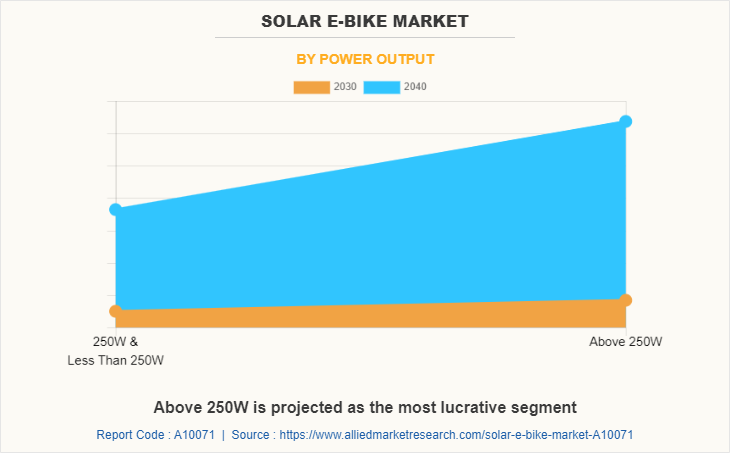
Technology advancement in solar e-bikes
With the growing popularity of solar e-bikes, these bikes are witnessing technological advancements in design, electronics, and manufacturing processes across the world. The advancement in solar technology such as adoption of nano solar technology has freed the e-bike riders from the chains of limited battery life with extended range. Moreover, improvements in solar cell technology (nanocrystal solar cells), combined with ingenious placement of solar cells, offers convenient solar charging option by delivering opportunity for placing solar cells or solar panels on electric bikes to help charge batteries.
Moreover, over time, various connectivity solutions have been developed by manufacturers and service providers to improve security, safety and serviceability of these bicycles. For instance, in 2019, engineering and technology company Bosch, unveiled new Smartphone Hub for solar e-bikes which offers wide range of functions including everything from navigation, music control, fitness tracking, making calls, performing diagnostics on the solar e-bike and using smartphone services and apps such as Strava or komoot. Thus, the advancement in the technology of solar e-bikes owing to their demand is expected to offer lucrative growth opportunities for the solar e-bikes market.
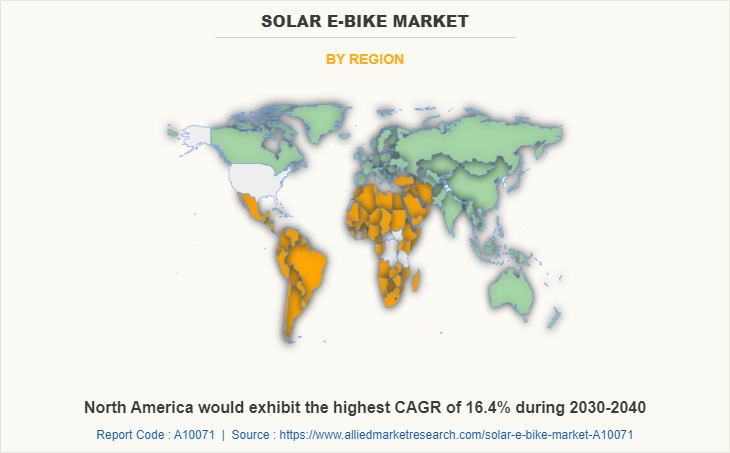
Key Benefits For Stakeholders
This study presents analytical depiction of the global solar e-bike market analysis along with current trends and future estimations to depict imminent investment pockets.
- The overall solar e-bike market opportunity is determined by understanding profitable trends to gain a stronger foothold.
- The report presents information related to the key drivers, restraints, and opportunities of the global solar e-bike market with a detailed impact analysis.
- The current solar e-bike market is quantitatively analyzed from 2030 to 2040 to benchmark the financial competency.
- Porter’s five forces analysis illustrates the potency of the buyers and suppliers in the industry.
Solar E-Bike Market Report Highlights
| Aspects | Details |
| By Motor Type |
|
| By Battery Type |
|
| By Application |
|
| By Consumer Segment |
|
| By Power Output |
|
| By Region |
|
| Key Market Players | Trek Bicycle Corporation, KONA BICYCLE COMPANY, OLYMPUS BIKES, Merida Industry Co, Ltd, Kvaern (Key Innovator), DOREL INDUSTRIES INC., CSE EV GROUP CO LTD, SPECIALIZED BICYCLE COMPONENTS, INC., Fuji-ta Bicycle Co., Ltd., Derby Cycle, CERVELO, Royal Dutch gazelle, Yadea Group Holdings Ltd, Giant Manufacturing Co., Ltd., Yamaha Motor Co. Ltd., Accell Group |
Analyst Review
Based on the interviews of various top-level CXOs of leading companies, rapid urbanization across globe and implementation of stringent laws toward CO2 emission drive the growth of the global solar e-bikes market. Moreover, consumer inclination toward the use of solar electric bike as an eco-friendly and efficient solution for commute and increase in fuel costs supplement the market growth. In addition, rise in interest in cycling as a fitness and recreational activity and improvement in cycling infrastructure & battery technology fuel the market growth. Also, the flourishing tourism industry has prompted a rising number of tourists to opt for solar e-bikes as a self-driving alternative to commute due to their effortless riding experience. These bikes are also extensively used for various adventure sports, increasing their popularity among the younger generation.
In addition, an increase in government support for solar e-bikes charging infrastructures and the implementation of stringent laws toward CO2 emission drive the growth of the global solar e-bikes market. For instance, in June 2022, the Metropolitan Manila Development Authority (MMDA) announced to launch the public its free solar charging station for solar electric bikes and electric scooters. According to Paul Lee, Mark Casey, and Craig Wigginton (Global Head of Research for the technology, media, and telecommunications (TMT) industry at Deloitte), it expects 130 million e-bikes (including solar e-bikes) and e-bicycle to be sold globally between 2020 and 2023. This is attributed to technological innovations in electric bikes, making them more attractive for commuters. Moreover, various connectivity solutions have been developed by manufacturers and service providers to improve security, safety and serviceability of these bicycles. For instance, in 2019, engineering and technology company Bosch, unveiled new Smartphone Hub for solar e-bikes which offers wide range of functions including everything from navigation, music control, fitness tracking, making calls, performing diagnostics on the solar e-bike.
Factors such as positive government regulations and policies to encourage the use of solar e-bikes, increase in fuel costs, and rise in interest in cycling as a fitness & recreational activity is expected to drive the market growth. However, high purchase & and maintenance cost of solar e-bikes and low operating efficiency of solar e-bikes as compared to traditional bikes are some of the factors that hinders the market growth. Furthermore, technology advancement in solar e-bikes and improvement in the bicycle infrastructure are expected to offer lucrative opportunities for market growth.
Among the analyzed regions, Asia-Pacific is the highest revenue contributor, followed by Europe, North America, and LAMEA. On the basis of forecast analysis, LAMEA is expected to lead during the forecast period, due to increase in concerns related to emission of hazardous pollutants fuels the adoption of solar e-bikes in developing countries across the LAMEA.
The global solar e-bike market set to reach at $1.66 billion in 2030, and is projected to reach $6.01 billion by 2040.
The global solar e-bike market is projected to grow at a compound annual growth rate of 13.7% from 2030 to 2040 to reach $6.01 billion by 2040.
The key players that operate in the solar e-bike market such as Accell Group, CSE EV Group Co., Ltd., Derby Cycle, Fuji-Ta Bicycle Co., Lt., Giant Group, Merida Bikes, Royal Gazelle, Trek Bicycle Corporation, Yadea Technology Group Co, Ltd., Yamaha Motor Corporation, Kona Bikes, The Sun Trip, Vintage Electric Bikes, Charge And Bottecchia Cicli S.r.l
Asia-Pacific is the highest revenue contributor.
Factors such as positive government regulations and policies to encourage the use of solar e-bikes, increase in fuel costs, and rise in interest in cycling as a fitness & recreational activity is expected to drive the market growth.
Loading Table Of Content...



